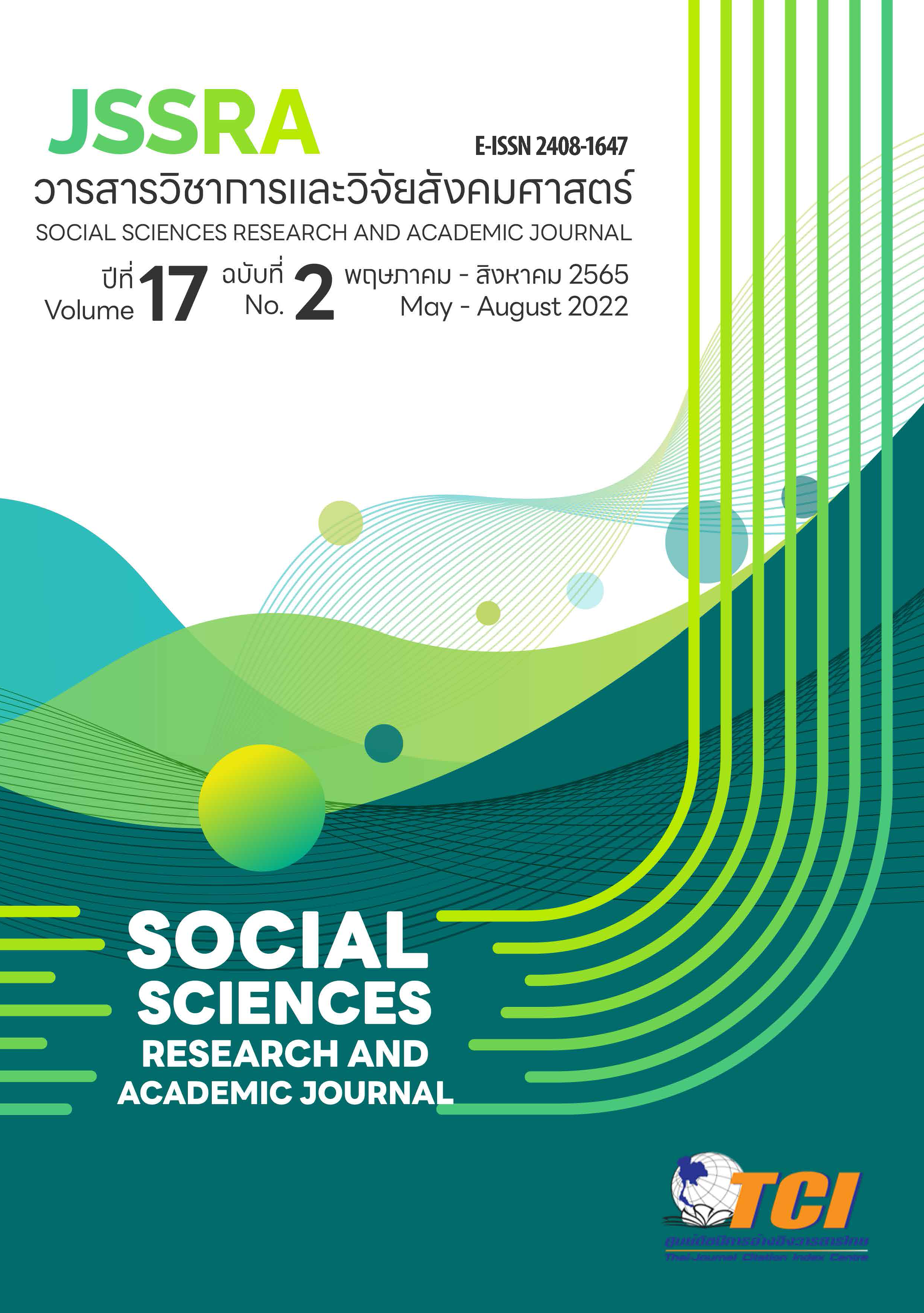อิทธิพลของการบริหารผลการปฏิบัติงานและความยุติธรรมในองค์กรต่อความผูกพันต่อองค์กรของบุคลากรโรงพยาบาลเอกชน Influences of Performance Management and Organizational Justice on Employees’ Organizational Commitment, Private Hospitals
Main Article Content
Abstract
งานวิจัยนี้มีวัตถุประสงค์ 1) เพื่อศึกษาการบริหารผลการปฏิบัติงาน ความยุติธรรมในองค์กรและความผูกพันต่อองค์กรของโรงพยาบาลเอกชน 2) เพื่อศึกษาอิทธิพลของการบริหารผลการปฏิบัติงานที่มีต่อความผูกพันต่อองค์กรและความยุติธรรมในองค์กร และ 3) เพื่อศึกษาอิทธิพลของความยุติธรรมในองค์กรต่อความผูกพันต่อองค์กร การวิจัยนี้เป็นงานวิจัยเชิงสำรวจและเก็บรวบรวมข้อมูลโดยใช้แบบสอบถาม กลุ่มตัวอย่างคือเจ้าหน้าที่ทางการแพทย์ประเภททำงานเต็มเวลาจำนวน 200 คน จากโรงพยาบาลเอกชน 6 แห่ง ในภาคตะวันออกเฉียงเหนือตอนล่างสอง ประเทศไทย โดยกำหนดลักษณะของกลุ่มตัวอย่างต้องมีอายุงานอย่างน้อย 1 ปี เลือกกลุ่มตัวอย่างด้วยวิธีการแบ่งชั้นภูมิและการเลือกแบบสะดวก การวิเคราะห์ข้อมูลทางสถิติใช้การวิเคราะห์สมการโครงสร้าง ผลการวิจัยพบว่า โรงพยาบาลเอกชนมีการบริหารผลการปฏิบัติงานอยู่ในระดับมาก กลุ่มตัวอย่างรับรู้ว่าตนเองได้รับความยุติธรรมจากองค์กรในระดับปานกลาง และมีความผูกพันต่อองค์กรในระดับปานกลาง รูปแบบอิทธิพลของการบริหารผลการปฏิบัติงานและความยุติธรรมในองค์กรต่อความผูกพันต่อองค์กรของบุคลากรโรงพยาบาลพยาบาลเอกชนมีความสอดคล้องกับข้อมูลเชิงประจักษ์ กล่าวคือ เมื่อองค์กรมีระดับการบริหารผลการปฏิบัติงานมากขึ้นจะส่งผลทำให้บุคลากรมีความผูกพันต่อองค์กร และรับรู้ว่าได้รับความยุติธรรมจากองค์กรมากตามไปด้วย แต่ทั้งนี้การรับรู้ว่าได้รับความยุติธรรมจากองค์กรไม่ได้ส่งผลทำให้บุคลากรมีความผูกพันต่อองค์กร ผลการวิจัยนี้ทำให้โรงพยาบาลเอกชนตระหนักถึงความสำคัญของการบริหารผลการปฏิบัติงาน และรู้ระดับของการบริหารผลการปฏิบัติงาน ซึ่งจะสามารถนำไปกำหนดแผนการบริหารจัดการองค์กรในด้านดังกล่าวได้อย่างมีประสิทธิภาพ
The purposes of this study were 1) to study the implementation of performance management among private hospitals, 2) to study the influence of performance management and organizational justice on employees’ organizational commitment, and 3) to study the influence of organizational justice on employees’ organizational commitment. This research employed a survey research. Data were collected by questionnaire. The samples participating in this study were at 200 full time medical staff from 6 hospitals within the lower northeastern part two, Thailand. The specific criterion of having at least one year experience in service was identified. The sample was selected based on firstly, stratified random sampling method and secondly, convenience sampling. Structural equation modeling was used for hypothesis testing. In findings, the private hospitals have implemented in the notion of performance management at high level, and perceived organizational justice and organizational commitment are at a moderate level. The structural equation model of influence of performance management and organizational justice on employees’ organizational commitment is valid and fit to the empirical data. Performance management has positively and significantly influenced on employees’ organizational commitment (β=0.59, P<0.01). Performance management has positively and significantly influenced on organizational justice (β=0.82, P<0.01). On the contrary, organizational justice has not significantly influenced on employees’ organizational commitment. This findings provide the guideline to manage employees’ performance for private hospitals in order to promote perceived organizational justice and employees’ organizational commitment.
Article Details
References
กรสรรค์ เอนกศักยพงศ์. (2556). กระบวนการบริหารทรัพยากรมนุษย์ที่มีผลต่อประสิทธิภาพการปฏิบัติงานของอุตสาหกรรมยานยนต์และชิ้นส่วน. วิทยานิพนธ์ปริญญาบริหารธุรกิจมหาบัณฑิต (วิชาเอกการจัดการทั่วไป). มหาวิทยาลัยเทคโนโลยีราชมงคลธัญบุรี, ปทุมธานี.
จุฑามาศ ทวีไพบูลย์วงษ์. (2559). การบริหารผลการปฏิบัติงานของกิจการภาคการผลิตในจังหวัดชลบุรี. วารสารวิชาการมหาวิทยาลัยฟาร์อีสเทอร์น, 10(4), 84-96.
ชยาภรณ์ แสงเฟื่อง. (2560). อิทธิพลของผลตอบแทนขององค์การต่อพฤติกรรมการเป็นสมาชิกที่ดีขององค์การความผูกพันกับองค์การและผลการปฏิบัติงานของพนักงานธนาคารพาณิชย์ไทย. วิทยานิพนธ์ปริญญาบริหารธุรกิจดุษฎีบัณฑิต. มหาวิทยาลัยรามคำแหง, กรุงเทพมหานคร.
ชัญภร เสริมศรี. (2558). ความสัมพันธ์ระหว่างการบริหารทรัพยากรมนุษย์กับความผูกพันต่อองค์การของบุคลากรบริษัทแห่งหนึ่งในเขตนิคมอุตสาหกรรมอมตะนคร จังหวัดชลบุรี. วิทยานิพนธ์รัฐประศาสนศาสตรมหาบัณฑิต (สาขาวิชาการบริหารทั่วไป). มหาวิทยาลัยบูรพา, ชลบุรี.
ณพัชญ์ปภา สว่างนุวัตรกุล. (2562). ความผูกพันต่อองค์การจากมุมมองบุคลากรทางการศึกษาเจเนอเรชั่นวาย. วารสารช่อพยอม, 30(2), 109-118.
นิอร ศรีสุนทร. (2559). การพัฒนารูปแบบการบริหารผลการปฏิบัติงานของสำนักงานเขตพื้นที่การศึกษาประถมศึกษา. ดุษฎีนิพนธ์ (สาขาวิชาการบริหารการศึกษา). มหาวิทยาลัยบูรพา, ชลบุรี.
ปาริชาติ ปานสำเนียง และวิโรจน์ เจษฎารักษณ์. (2556). การศึกษาคุณภาพชีวิตในการทำงานและการรับรู้ความยุติธรรมในองค์กรที่มีอิทธิพลต่อพฤติกรรมการเป็นสมาชิกที่ดีต่อองค์กรผ่านความผูกพันต่อองค์กรของพนักงานมหาวิทยาลัยสายสนับสนุนกรณีศึกษาคณะแพทย์แห่งหนึ่งในกรุงเทพมหานคร. วารวิทยบริการ, 24(2), 129-142.
พัชราวดี ทองเนื่อง. (2560). แบบจำลองเชิงสาเหตุของพฤติกรรมการปรับเปลี่ยนวิถีชีวิตในผู้ใหญ่ไทยที่มีภาวะความดันโลหิตสูง. ดุษฎีนิพนธ์ (สาขาวิชาการพยาบาล). มหาวิทยาลัยสงขลานครินทร์, สงขลา.
พูลสุข นิลกิจศรานนท์. (2562). แนวโน้มธุรกิจ/อุตสาหกรรมปี 2562-64 ธุรกิจโรงพยาบาลเอกชน. สืบค้นเมื่อ 21 ธันวาคม 2562, จาก https://www.krungsri.com/bank/getmedia/42e5f42d-4465-4304-92af-60e3c2539460/IO_Private_Hospital_190218_TH_EX.aspx
ยุทธนา แซ่เตียว, และทิพย์รัตน์ เลาหวิเชียร. (2560). อิทธิพลของการบริหารผลงานต่อทัศนคติในการประเมินผลและพฤติกรรมในการปฏิบัติงาน. BU ACADEMIC REVIEW, 16(1), 101- 114.
วิชญ อภิบาลศรี. (2558). อิทธิพลการบริหารทรัพยากรมนุษย์ที่มีต่อความผูกพันต่อองค์การของพนักงานระดับปฏิบัติการธุรกิจโรงแรมในพื้นที่จังหวัดมุกดาหาร จังหวัดนครพนม จังหวัดหนองคาย. วิทยานิพนธ์ปริญญาบริหารธุรกิจมหาบัณฑิต (ศิลปศาสตร์และวิทยาการจัดการ). มหาวิทยาลัยเกษตรศาสตร์, สกลนคร.
วีระยุทธ วงศ์รักษา. (2558). ความสัมพันธ์ระหว่างระบบการบริหารผลการปฏิบัติงานวัฒนธรรมองค์การความผูกพันต่อองค์การและผลการดำเนินงานของการประปาส่วนภูมิภาค. สืบค้นเมื่อ 1 ธันวาคม 2562, จาก http://www.hrd.nida.ac.th/hromd2015/UploadFile/File_76.pdf
สถาบันวิจัยประชากรและสังคม. (2560). รายงานสุขภาพคนไทย 2560. สืบค้นเมื่อ 1 ธันวาคม 2562, จาก https://www.thaihealth.or.th/Books/list/22/
สำนักงานสถิติแห่งชาติ. (2557). การสำรวจค่าตอบแทนภาคเอกชน พ.ศ. 2556. กรุงเทพฯ: สำนักงานสถิติแห่งชาติ.
โสเพ็ญ ชูนวล. (2559). การพัฒนาและตรวจสอบคุณภาพเครื่องมือวิจัยทางการพยาบาล. วารสารการปฏิบัติการพยาบาลและผดุงครรภ์ไทย, 3(1), 64-80.
Ahmad, A. (2018). The relationship among job characteristics organizational commitment and employee turnover intentions. Journal of Work-Applied Management, 10(1), 74-92.
Boomsma, A. (1985). Non-convergence, improper solutions, and starting values in LISREL maximum likelihood estimation. Psychometrika, 50(2), 229–242.
Das, H. (2003). Performance Management. Toronto: Pearson Prentice Hall.
Farndale, E., Hope-Hailey, V., & Kelliher, C. (2011). High commitment performance management: The roles of justice and trust. Personnel Review, 40(1), 5-23.
Hair, J. F., Black, W. C., Babin, B. J., & Anderson, R. E. (2010). Multivariate data analysis: A global perspective. New Jersey: Pearson Prentice Hall.
Huseman, R. C., Hatfield, J. D., & Miles, E. W. (1987). A new perspective on equity theory: The equity sensitivity construct. The Academy of Management Review, 12(2), 222-234.
Kline, R. B. (2015). Principles and practice of structural equation modeling (4th ed.). New York: Guilford publications.
Loew, L. (2015). Performance management 2015: Coaching for development needed. Retrieved November 1, 2019, From https://humanresourcereports.info/resourcefiles/
Marques, T., Galende, J., Cruz, P., & Ferreira, M. P. (2014). Surviving downsizing and innovative behaviors: A matter of organizational commitment. International Journal of Manpower, 35(7), 930-955.
Meyer, J.P. & Allen, N.J. (1991). A three-component conceptualization of organizational commitment. Human Resource Management Review, 1(2), 61- 89.
Park, Y., Song, J. H., & Lim, D. H. (2016). Organizational justice and work engagement: The mediating Effect of self-leadership. Leadership & Organization Development Journal, 37(6), 711-729.
Schumacker, R. E., & Lomax, R. G. (2004). A beginner's guide to structural equation modeling (2nd ed.). New Jersey: Lawrence Erlbaum Associates.
Srivastava, A. P., & Dhar, R. L. (2016). Impact of leader member exchange, human resource management practices and psychological empowerment on extra role performances. International Journal of Productivity and Performance Management, 65(3), 351-377.
Suliman, A., & Kathairi, M. A. (2012). Organizational justice, commitment and performance in developing countries. Employee Relations, 35(1), 98-115.
Ugboro, I. O. (2003). Influence of managerial trust on survivors’ perceptions of job insecurity and organizational commitment in a post restructuring and downsizing environment. The Journal of Behavioural and Applied Management, 4(3), 230-253.


